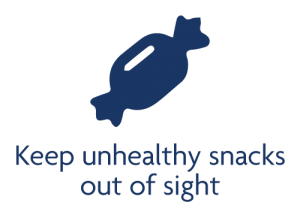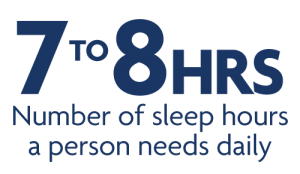A Plan Is Paramount
A Healthy You
JUMP TO: Home | Calories Can Count | Nutrients Are Key | Portion Size Matters | A Plan Is Paramount
A Plan Is Paramount
Recognize what derails you. It’s not just about willpower, and it doesn’t matter how much you know about healthy eating, sometimes life presents challenges that affect your choices. Whether it’s the office candy bowl, stress, late night refrigerator raids, or your environment, learning to recognize these barriers to success will help you overcome them, and set you on a long path to healthy eating.
Take Charge of Stress

It’s been tough day, and in the moment, it feels like ice cream will melt your cares away. While it may make you feel better temporarily, in the long-term, stress will more likely lead to extra pounds, which can cause more stress and anxiety, and more eating. It’s a vicious cycle.
Instead of reaching for food:
- Get moving: Go for a walk, hit the gym, or head out for a bike ride. Exercise increases the feel-good hormone serotonin and busts your stress-hormone cortisol.
- Call a friend who can make you laugh: Laughing has some of the same hormonal effects as exercise.
- Breathe deep: Step outside and breathe in some fresh air, or give yourself a few minutes indoors to slow down and concentrate on your breathing.
- Clock some quality time with your pillow: 7-8 hours per night.
Manage Midnight Munchies
50 Snacks for Success
Burning the midnight oil? It’s OK to eat a snack as long as it fits within your calorie budget. Instead of calling your favorite pizza delivery service or reaching for the cookie jar, keep healthy snacks nearby. Try some of the following 100 or 200 calorie snacks to keep you energized:
Under 100 calories:
- 1 cup mixed raw vegetables like celery, carrots, and bell peppers with 2 Tbsp. hummus
- “Cheesy” popcorn: 2 cups air popped popcorn (no butter added) with 1 Tbsp. nutritional yeast, or purchase brands such as Quinn, Lesser Evil, or Skinny Pop
- 1 medium apple or pear
- 1 hard-boiled egg with a pinch of salt and pepper
- Chocolate banana: ½ frozen banana dipped in 2 tsp. melted dark chocolate. Put in the freezer for an ice cream-like treat!
Deflect Distractions
Picture this: It’s dinner time, and you sit down to eat with your cell phone by your side (time to read emails or check social media!) and the news on in the background. Before you know it, you look down and your plate is empty and you’re headed to the kitchen to scoop up seconds. When you do other things while you’re eating, you lose some awareness of what and how much you have eaten, which can lead to overeating.
Practice eating without distractions:
- Power down at mealtime: Go old school and enjoy your meal with someone special instead of your phone.
- Get some (real) face time: Do something revolutionary and leave your desk at lunch to break bread with others. In the evenings make some meals a social activity and eat with friends or family at a table instead of in front of your TV on the couch.
- Savor, Pause, Repeat: Even the simplest meal can be a pleasure if you take time to savor it. Use all of your senses to pay attention to your meal’s colors, textures and aromas.
Mind(less) Temptations

Does your coworker keep an irresistible jar of candy on her desk? Are there always leftover pastries sitting in the break room? Those occasional (or regular!) handfuls can really add up. If you find yourself mindlessly nibbling on office treats, use the following strategies to halt this habit.
- Re-route yourself: Take a different route to the bathroom/meeting room/printer, etc. so you don’t have to walk by your coworker’s candy jar. Avoid the break room if that’s where leftover meeting treats are left. If your boss orders snacks for a meeting, sit at the opposite end of the table or bring your own (healthy) snack. Out of sight, out of mind!
- Keep a healthy stash: Store healthy snacks at your desk, and fill up on those instead of reaching for the leftover goodies from a lunch meeting.
- Strategize: If you don’t want to skip your regular afternoon coffee break with a friend or coworker, plan to order a coffee with lowfat milk (decaf is best in the afternoon so your sleep isn’t interrupted) or an herbal tea. Skip the sugary drinks and cookie.
Say Yes to Sleep
Lack of sleep can play a role in weight management and your food choices. Research shows that people who average only 5 or 6 hours of sleep per night are more likely to be overweight or obese than those who get 7-8 hours per night. When you don’t get enough sleep, your hunger and satiety hormones may become off balance. Production of the hormone leptin, which tells your brain that you are full, decreases when you are sleep deprived. In addition the production of ghrelin, the hunger hormone, increases. This double whammy can leave you feeling hungrier and ultimately lead to eating more.

What you eat may affect the quality of your sleep too. Research suggests that people who eat more foods filled with fiber and fewer foods with saturated fat have better quality of sleep. So, sleep and diet are much more intertwined than you may think!